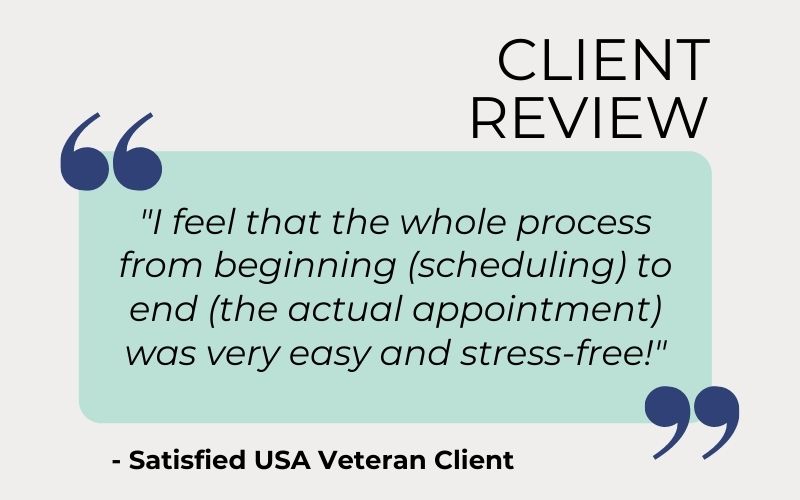Could Your Migraines Be Service Connected?
By Elizabeth Crain
3/10/2022
Could You Qualify for Service-Connected Migraines?
If you are a veteran and suffer from frequent migraines, you may be able to receive VA disability for headaches. Migraines are common among veterans—roughly 36 percent of veterans who served in Iraq for a year have been diagnosed with or experienced symptoms of migraines. Not to mention, veterans are more likely than civilians to develop chronic headache conditions in general.

Headaches every now and then might not be a cause for concern, but frequent and severe headaches should be evaluated by a medical professional. It may be related to a chronic medical condition and, more importantly, service related.
In order to know if you can attain additional benefits because of service-connected headaches, it’s helpful to understand what qualifies as a service-connected migraine. This quick guide will help you understand migraines as they relate to your time in service.
What Is a Migraine?

Migraines are headaches that cause moderate to severe throbbing or pulsing pain, usually on one side of the head.
Migraines can last anywhere from a few hours to several days and may come with symptoms such as nausea, dizziness, or sensitivity to light and sounds.
Migraines generally encompass four stages:
- Prodrome: Prodrome is the period before the actual migraine. You might experience a stiff neck, a change in mood, constipation, food cravings, or increased thirst and urination.
- Aura: Aura consists of visual disturbances such as flashes of light and blind spots. It may also cause a tingling sensation throughout the body and sensory or motor disturbances.
- Migraine: This third stage is when the actual migraine occurs. As noted earlier, you will usually experience throbbing or pulsing pain on one side of your head, along with the other symptoms mentioned above. Migraines generally last from four to seventy-two hours if left untreated.
- Post-drome: In this final phase, though the migraine has passed, people experience exhaustion, confusion, or moodiness. They can also continue to experience sensitivity to light or sound.

How Do You Get Your Migraines Service-Connected?

Receiving service connection for migraines and headaches requires providing the VA with three items:
1. A Current Medical Diagnosis For Your Headaches
You will need evidence of your migraine. This requires getting in touch with a medical professional who can discuss your symptoms and provide you with a diagnosis.
Telemedica can connect you with our network of independently contracted providers who can offer telehealth examinations.

Quick Tip: A great way to track the condition and severity of your headaches is to keep a log. Writing down how you’re feeling from day to day and keeping track of how your headaches affect you can help your provider understand the big picture. Keeping a log of your symptoms when they arise provides more evidence for your condition which will be beneficial when talking to your provider about your diagnosis. Consider keeping a small journal on you or starting a log in the notes app on your phone to get started.
2. Proof That An In-Service Event or Condition Caused Your Headaches
Several injuries that might be connected to migraines can happen during active duty. One of the common links is traumatic brain injury (TBI)—sudden damage to the brain caused by exposure to explosives, loud noises, or chemicals.
Proof that illustrates an in-service event or condition triggered your headache is required. Proof can be documented evidence that shows any of the following:
- You were treated for migraines in service
- You had an injury or illness during service that caused your migraines
- You were exposed to specific environments such as burn pits, or were near explosives
If your migraine is secondary to another condition (e.g. a cervical spine condition that causes migraines), you will need to document that your primary disability caused your migraines.

To read more about what our clients have to say about our services click here.
3. A Medical Nexus That Connects Your In-Service Event to Your Headaches
Your healthcare provider can issue a medical nexus letter, which links your migraine to military service with proof. A medical nexus from a healthcare provider is key in obtaining VA disability for headaches.
Telemedica’s independently-contracted providers can provide nexus letters based on previously diagnosed disability conditions related to:
- Direct service connections
- Secondary service connections
- Presumptive service connections

How Does the VA Rate Service-Connected Migraines?

When you file a service connection for your migraine along with medical proof, a VA will usually schedule a compensation and pension exam. The examiner will gather information about your condition to determine the severity of your migraines.
The VA rating for headaches ranges from zero to fifty percent: zero percent being less frequent and fifty percent being more frequent and prolonged – leading to prostrating.

Note: Prostrating refers to severe and debilitating migraines that cause one to lay down for an extended period of time.
The higher rating you get, the more likely you will be able to receive VA disability benefits for your migraines. Since these ratings indicate the frequency of migraine attacks, discuss this with your healthcare provider. They may include it in your medical record, which can be helpful when applying for disability.
Seek Help for Your Service-Connected Migraines Today
If you’re a veteran who is experiencing frequent headaches or migraines, contact Telemedica. Our medical team understands the needs of the Veteran community and can provides telemedicine examinations and the medical evidence necessary to acquire your VA benefits. Learn more about our services.